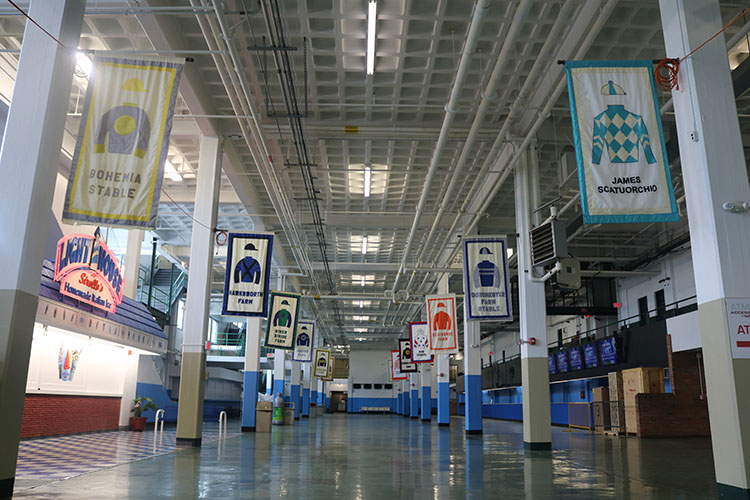By Jay Cook and Chris Rotolo
OCEANPORT – Monmouth Park hedged its bets when no others were willing to and that risk will soon pay off as the 19th century horse racing track plans to be the first to welcome sports betting to New Jersey later this summer.
Horse racing aficionados and state officials were jubilant Monday morning, May 14, after the U.S. Supreme Court shot down a federal law barring states from legalizing sports wagering. The reversal means New Jersey and its struggling horse racing and casino industries can reap the benefits of a potential estimated $10 billion sports betting industry.
“It’s survival,” said Dennis Drazin, chairman and CEO of Darby Development, operators of Monmouth Park. “It’s a historic case for the country, but for all of us here in New Jersey, it’s the survival of an industry that was threatened and depressed.”
Monmouth Park, as part of the New Jersey Thoroughbred Horsemen’s Association, and the state of New Jersey, joined together against the four major professional sports leagues and the National Collegiate Athletic Association (NCAA) to fight the Professional and Amateur Sports Protection Act (PASPA) of 1992. Oral arguments heard in December clearly had an impact on the nation’s highest court.
The Supreme Court sided with New Jersey’s claim that PASPA was unconstitutional.
“The legalization of sports gambling requires an important policy choice, but the choice is not ours to make,” Justice Samuel Alito wrote in the 6-3 opinion of the court. “Congress can regulate sports gambling directly, but if it elects not to do so, each State is free to act on its own. Our job is to interpret the law Congress has enacted and decide whether it is consistent with the Constitution. PASPA is not.”
That decision paves the way not only for a new era for Monmouth Park, but also racetracks and casinos around the state. Soon after the Supreme Court decision on Monday morning, state lawmakers went to work drafting legislation to regulate the new industry and create revenue generation guidelines.
Bills currently introduced in the state Legislature propose an 8 percent gross revenue tax on wagering and a 12.5 percent levy for online wagering, which would fund programs for senior citizens and the disabled. A 1.25 percent tax on revenues would be distributed to the host counties and municipalities – with 0.75 percent paid to the host municipality and 0.5 percent paid to the county.
Bets will only be taken at casinos, racetracks and former racetracks where a horse race was held within the last 15 years, per the legislation. People placing bets have to be at least 21 years old. Placing wagers on high school sporting events would be prohibited.

The Division of Gaming Enforcement and the New Jersey Racing Commission will be responsible for licensing and communicating sports betting conduct regulations.
“I am thrilled to see the Supreme Court finally side with New Jersey and strike down the arbitrary ban on sports betting imposed by Congress decades ago,” Gov. Phil Murphy said in a statement. “New Jersey has long been the lead advocate in fighting this inherently unequal law, and today’s ruling will finally allow for authorized facilities in New Jersey to take the same bets that are legal in other states in our country.”
What Happens Next?
As lawmakers go through the regulatory process and craft legislation, Monmouth Park is preparing to take ceremonious bets on May 28, according to multiple media reports earlier this week.
Drazin said that signifies the first transformation of Monmouth Park into the state’s leading sports wagering facility.
“Despite all those who kind of felt it was like Don Quixote tilting at windmills, we have won,” said Drazin. “There has come a day when Goliath is defeated by David. We’re at a point where this is history in the United States.”
While admittedly unsure of how other racetracks might operate, Drazin said he wants sports betting revenues from his track to regenerate purses and amenities surrounding horse racing and bring it back to prominence.
It’s been no secret that racetracks around the Garden State have fallen on hard times in recent years. It’s a $4 billion industry supporting over 13,000 jobs with about 176,000 acres of open space statewide.
Subsidies were yanked in 2011 and ultimately it became more difficult to attract owners and horses to New Jersey. Monmouth Park has been no exception. Drazin said race purses have dropped from $50 million in 2010 to only $18 million last year. Seasons have also been cut from over 200 days down to 52 days.
With this Supreme Court ruling, Monmouth Park fans can expect the racetrack, which first opened in 1870, to be a leading force in New Jersey’s newest industry.
William Hill, the race and sports book operating in Oceanport, will seemingly be part of any expansion. Drazin said nearly $2.5 million has gone into preparing the William Hill Race & Sports Bar and the Monmouth Park grandstand area into a sports betting hub.
Drazin also said there’s a deal with William Hill to spend another $5 million to turn The Lady’s Secret Café into “another Las Vegas-style sports book.” That’s dependent on the state legalizing sports betting.
“We’ve been working towards this day for a long time and take great satisfaction in the Supreme Court’s decision,” William Hill U.S. CEO Joe Asher said in a statement.
“We’re going to get ready to open for business at Monmouth Park as soon as responsibly possible,” he added.
Other possible additions to and around the racetrack could be cash cages, facial recognition cameras, wagering at kiosks, as well as online and through an app. Drazin said he’ll look to bring in E-Sports and “skill-based” sports to attract millennials. Hotels could be an option, as well as reviving plans for a $19 million concert venue there.
“I think that 10 years from now, Monmouth Park will maintain its old school charm and it will still preserve its world-class racing venue like it’s always done,” said Drazin. “But you’ll see other types of entertainment for the families of New Jersey and the local people in Monmouth County to come here and enjoy.”
Oceanport Thrilled with Decision
With plans to make Monmouth Park into a major, multifaceted destination, one of the main benefactors will be the approximate 5,800 residents who call Oceanport home.
In the wake of the U.S. Supreme Court decision, Oceanport Mayor Jay Coffey exuded confidence on behalf of the town, noting the borough as a whole is the real winner.
“The racetrack industry is not a standalone industry anymore,” Coffey said. “This is the first step in a multistep journey that will allow for other types of revenues to come to Monmouth Park…and it’s a win for all of us. Because the better they do, the better it is for Oceanport.”
Oceanport’s state legislature representative, Sen. Declan O’Scanlon (R-13), said the ruling will undoubtedly help the borough.
“This is a huge victory for justice and fairness as there has been a bipartisan effort for years to address this arbitrary ban on sports betting,” he said. “Monmouth Park is a vital cornerstone for our community in Oceanport, and further, for the entire region.”
Assemblyman Eric Houghtaling (D-11) told reporters on Monday that the benefits soon coming from a legalized sports betting industry will trickle down to the municipalities like Oceanport and to his district in Freehold Borough, thanks to Freehold Raceway.
“Historically, (Monmouth Park) has been here for such a long time and it’s such a fabric of Oceanport that it’ll be even more successful as we move forward,” he said.
This article was first published in the May 17-24, 2018 print edition of The Two River Times.














